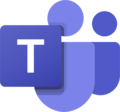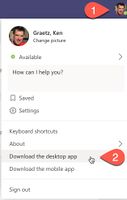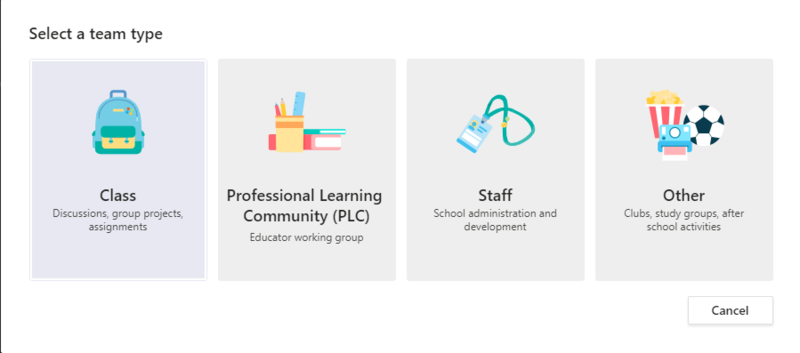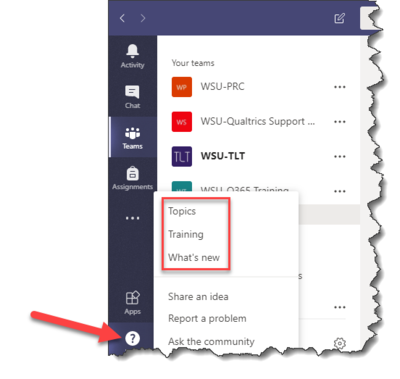Draft:Ann Loth-Creating Microsoft Teams
Project Details
This resource is designed to help students in Professor Loth's courses. In this course, will be using Microsoft Teams to work collaboratively online. Microsoft Teams is an application that supports group work. Access Teams through your web browser or by installing the desktop or mobile app. Create as many Teams sites for as many workgroups, committees, project teams or other groups as you wish. Use a Teams site for a short time and delete it or keep it open to support persistent groups and bigger projects. Each Teams site supports communication, file sharing, integration with other Office 365 and third party applications, and deep customization to help your group achieve specific goals and objectives. Every Teams site supports these common collaborative tasks:
Text, voice, and video messaging - Communicate with members of specific teams and with others at WSU and in the system using integrated text messaging and a built-in conferencing app. Cloud-based file storage and sharing - Share files of all sorts with other members of the team in a dedicated document library. Issue management - Use Microsoft Planner to track tasks and issues. Collaborative writing and note-taking - Share Microsoft Word, PowerPoint, Excel and other documents and use the dedicated OneNote notebook.
How to access Teams
Logging in
You can login to Teams via a browser or a desktop application. Regardless of which method you use, you will use StarID@minnstate.edu (employees) or StarID@go.minnstate.edu (students) as your username (e.g., jd8762vd@minnstate.edu) and your StarID password. Confirm using multifactor authentication if needed.
Browser
Access the online version of Microsoft Teams using your favorite Web browser and the following steps:
- Navigate to https://www.office.com and select Sign in.
- Select the Teams icon (Fig 1). The online version of Teams will open in another browser window.
Desktop app
Install Microsoft Teams on your laptop or desktop computer and launch it using the following steps:
- Log into the online version of Teams using your favorite Web browser and the steps above.
- Select your avatar in the upper right corner of the browser window and then select Download the desktop app (Fig 2).
- Download the installation file and run it on your computer. Follow the onscreen instructions to install it.
- Once installed, select the app's icon to launch Teams.
Mobile app
Install Microsoft Teams on your phone or tablet as you would any app. There is a iOS and Android version in the Apple App Store and Google Play, respectively. Microsoft Teams Mobile app
Accessing specific Teams sites
Once you have accessed Teams using one of the three methods above, select the Teams icon on the left side of the screen to see a list of all the specific sites that you can access. Select one to open it (Fig 3).
How to create a Teams site
Click the Teams icon in the left nav of Teams. From this screen you will find Join or Create Team in the top right corner.
Select Create Team
Select the type of team template to use.
Get a description of each type of team you can create. Most teams that are created will use the Other template.
Once you have created the team, invite people to join it. You can add individual users, groups, and even entire contact groups (formerly known as "distribution lists").
Add a team owner and members
Find the team that you created, click More options ... > Manage team" Then go to the Add Members tab. Find the people you want to designate as team owners. Under Role" click Owner. By default people are added as Members. You must be an Owner to add members to a Team.
Setup your Team
- How to add people to a team
- Create a new channel in Teams
- Upload and collaborate on files with your Team
- Find help within Teams. Use the ? mark in the lower left corner of the screen.
Communicate in Teams
There are several ways to communicate within Teams. Chat is global text messaging between two or more Minnesota State students and employees. This is private messaging system between the people in the Chat. Within each Team, there is a Post area in each Channel. These chats are accessible by anyone in the Team. Chats can also be turned into video conversations or meetings.
Microsoft Training Resources
LinkedIn Learning Training
LiL resources relevant to the topic on this page:
Check out the following courses in LinkedIn Learning to learn more about Microsoft Teams. Note that there are some references to licensing, features, and functions in these courses that do not apply to us. While these are pretty obvious, you can always contact TLT (tlt@winona.edu) with any questions.
- Microsoft Teams Essential Training
- Microsoft Teams Quick Tips
Troubleshooting
Why is Teams sometimes minimized when I return to my Mac?
- On macOS Teams seems to minimize itself to the dock following self-updates. Unlike other Microsoft apps, Teams does not usually prompt for updates. It just does them, reboots itself, then often restarts minimized to the dock. If you come back and Teams is minimized, that usually means it just updated itself. Teams is updated often and small bugs like this one are squashed all the time.
I can't find the Team I am supposed to be a part of?
- Depending on how the Team is set up you may need to be invited, sent a join code, or added by the Team Owner.
OK who is the Team Owner? What is a Team Owner? Why is a Team Owner?
- Microsoft Teams has two primary roles - Team Owner and Team Member. Team Owner is simply the administrator of that Team and can add/remove users, set team member permissions, etc. Team Members can fully interact with the Team, including adding posting to conversations, uploading files, etc.
I am having problems printing documents from Teams
To print you will need to first open the file with the Open in Desktop App under More Options... (top right corner) and then print from the desktop application. You cannot print documents directly from Teams view.
Known Issues for Microsoft Teams
| This work is licensed under a Creative Commons License Creative Commons Attribution-ShareAlike 4.0 International License. This is a Free Culture license. | 
|
For a complete listing of topics, select from the category list below.
DLC STARS/Presenter
- Chad Kjorlien
- ckjorlien@winona.edu
Other Resources
DLC Support
- Phone: 507-457-2206
- Email: dlc@winona.edu
- 1:1 Support: Krueger Library #105




